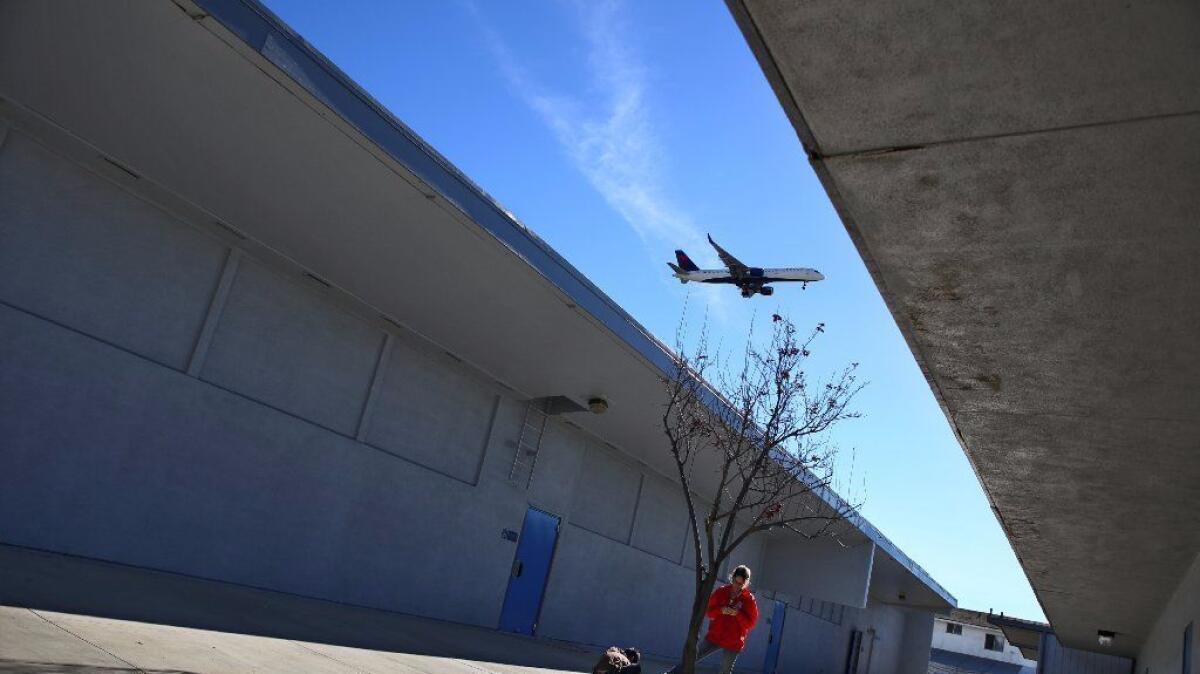Newport Beach is suing the FAA over new flight plans, and Culver City is expected to follow

- Share via
Citing concerns about the potential for increased aircraft noise and pollution, Newport Beach officials sued the Federal Aviation Administration on Thursday, alleging that the agency’s plan to reroute flights across the region was completed without adequate environmental review. Culver City officials said they expect to file an almost identical suit on Friday.
The federal lawsuits target the FAA’s Metroplex project, which intends to replace aging air traffic control systems, redesign Southern California’s busy airspace and change the arrival and departure procedures for 21 local airports, including Los Angeles International and John Wayne in Orange County.
FAA officials say they will phase in the new procedures from November through April. In that time, the agency will also conduct outreach to inform the public about the changes.
As the procedures are implemented, people will see and hear aircraft where they previously did not fly because of route changes and more concentrated flight paths.
We applaud Culver City in its action to protect its citizens.
— Mark Herscovitz, Culver City for Quiet Skies
The cities are challenging the environmental impact analysis, which concluded the project would not cause significant new problems.
Municipal officials contend that changes in flight paths and the new procedures will make many Southern California communities, including Culver City and Newport Beach, louder and more polluted.
“The city believes there are significant errors in the Southern California Metroplex environmental analysis,” Culver City Mayor Jim Clarke said. “Our hope is the FAA will work with us and other communities to mitigate the serious impact on our residents’ quality of life from these flight path changes.”
Newport Beach’s lawsuit was filed with the U.S. Ninth Circuit Court of Appeals, which handles cases against federal agencies. The suit alleges violations of the National Environmental Policy Act.
Both cities seek court orders to set aside project approvals and unsupported findings in the environmental analysis. In addition, they request that the project be halted until the FAA fully complies with the environmental policy act.
Culver City officials noted that over the past several years, residents have contacted the council repeatedly about jet noise and filed more than 1,000 complaints with the FAA and LAX.
More recently, about 300 residents signed a petition requesting that the City Council take action against the FAA to protect them from further impacts that could be caused by Metroplex procedures that will bring aircraft more directly over the city.
“We applaud Culver City in its action to protect its citizens,” said Mark Herscovitz, a founder of Culver City for Quiet Skies. “These new FAA changes are going to create a concentrated freeway directly over Culver City and communities to our east and allow more planes to fly even more often and closer together at the expense of the citizens below.”
Ian Gregor, a spokesman for the FAA in Los Angeles, said the agency does not comment on pending litigation as a matter of policy. He added, however, that the FAA stands by its environmental analysis.
Gregor has said the agency worked hard in the past to balance the need to modernize air traffic control procedures with the concerns of local communities. He also said Metroplex will lay the foundation for future air safety and the efficient use of the region’s airspace and airports.
The FAA made changes, including raising the altitude for planes flying over Culver City, based on public comment, according to earlier statements by the agency. Municipal officials dispute this, saying there is potential for aircraft to fly below the required 6,000 feet.
The Metroplex project — one of 14 in the nation — is the local application of procedures and technology from the FAA’s sweeping NextGen program. In Southern California, the new system includes 99 new departure, arrival and approach procedures that use GPS and sophisticated computers to guide aircraft until they are very close to their destination airports.
The system, which officials call state-of-the-art, is designed to track aircraft more precisely than current radar-based technology, potentially freeing up congested corridors and allowing pilots to make shorter, safer flights to their destinations. For passengers, the anticipated benefits include less time in the air, reduced taxiing times and the elimination of long delays on the tarmac or at terminals.
The Culver City and Newport Beach lawsuits are part of a growing number of legal challenges around the country that dispute the findings of the environmental review for Metroplex. Similar cases are pending in Boston, New York, Phoenix and the Bay Area.
More to Read
Sign up for Essential California
The most important California stories and recommendations in your inbox every morning.
You may occasionally receive promotional content from the Los Angeles Times.











